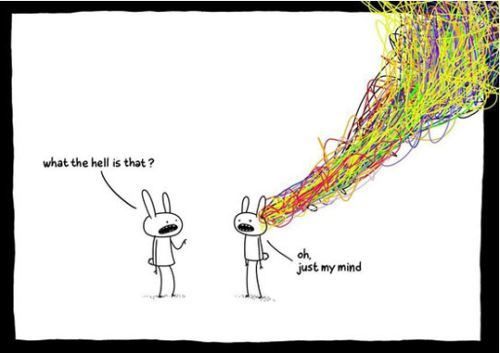 One night, home solo for dinner, I make myself a gorgeous plate of lemony greens over fresh whole wheat pasta, snowy with Parmesan cheese. A few of my cookbooks are still open on the table and I start paging through, looking at the pictures and searching for recipes I want to try. Soon, I'm putting the last bite into my mouth and I've barely tasted any of it.
One night, home solo for dinner, I make myself a gorgeous plate of lemony greens over fresh whole wheat pasta, snowy with Parmesan cheese. A few of my cookbooks are still open on the table and I start paging through, looking at the pictures and searching for recipes I want to try. Soon, I'm putting the last bite into my mouth and I've barely tasted any of it.I'm pissed. And disappointed. Despite my intentions and efforts to be more mindful, to be fully present and enjoying the food in front of me, this still happens more than I like to admit. I check the weather (and then my messages and then Instagram) on my phone, or I get absorbed reading the Nutrition Facts on the back of a package. But then I miss the moment, the amazing food in front of me. Studies show that being awake to the process of eating accounts for the majority of the satisfaction you feel. When your mind is distracted, you miss out on feeling satisfied.
You probably know what happens when you don't feel satisfied. You eat more - then or later - because you're still trying to get there. You feel bad about yourself and all your shortcomings. You make promises to yourself you can't keep. You restrict yourself. It's easy to spiral out. That's how I ended up binging on almond butter and cookie dough so many nights. It feels too shameful, too embarrassing, too huge and overwhelming to just change. All the the things you don't feel or don't want to feel, you wind up using food to try to fill or to distract yourself from your mental hunger. And so the cycle self-perpetuates, conveniently creating a problem to distract you from your real issues.
.JPG)
Here's the trick: You don't have to DO anything to change. But you have to BE with your discomfort and the dissatisfaction.
Ok, GRRREAT. That's what most of you are probably thinking. I didn't say this would be comfortable, remember? It's the opposite. The question is: Are you willing to go there and see what happens? I always thought I'd be opening Pandora's Box of Alex's Hot Mess and I'd have a breakdown that would incapacitate me for at least a year. But the most amazing part? (And I know you know this.) After a good, honest cry, you feel so much lighter.
Here are a few ways you can start allowing yourself to be with uncomfortable feelings in the moment:
- Crying. I mean it. LET IT OUT. When you hold it in, it becomes tension, it adds to the weight you are carrying around. Emotions are "e"nergy in "motion" - let it move through. Breathe.
- Running. When I have pent up emotional energy, expending physical energy helps me release. Exhaustion, while not necessary, is potent medicine. Think about a child who plays or cries themselves to sleep. A tired body or mind then shuts down to rest and rejuvenate.
- Tapping. This is a technique that allows to you accept what is happening instead of judging, resisting or avoiding it. I find the physical sensation to be incredibly grounding. Here's a basic how-to video on how to tap.
- Writing it out. I don't know where I'd be without my journal, the place I dump out my mind and hash out my feelings. I get such clarity from letting it all out on the page. Write knowing you can always burn it. There is such power in acknowledging for yourself what is really going on. Ask yourself: What am I really needing or hungry for?
- Voicing it. To my most inner, trusted circle, the people I wasn't afraid (although I still resisted) to cry in front of, people who I knew could just hold space and listen. Find a friend (or two) with whom you can be each others' lifelines. Or a professional you trust.








